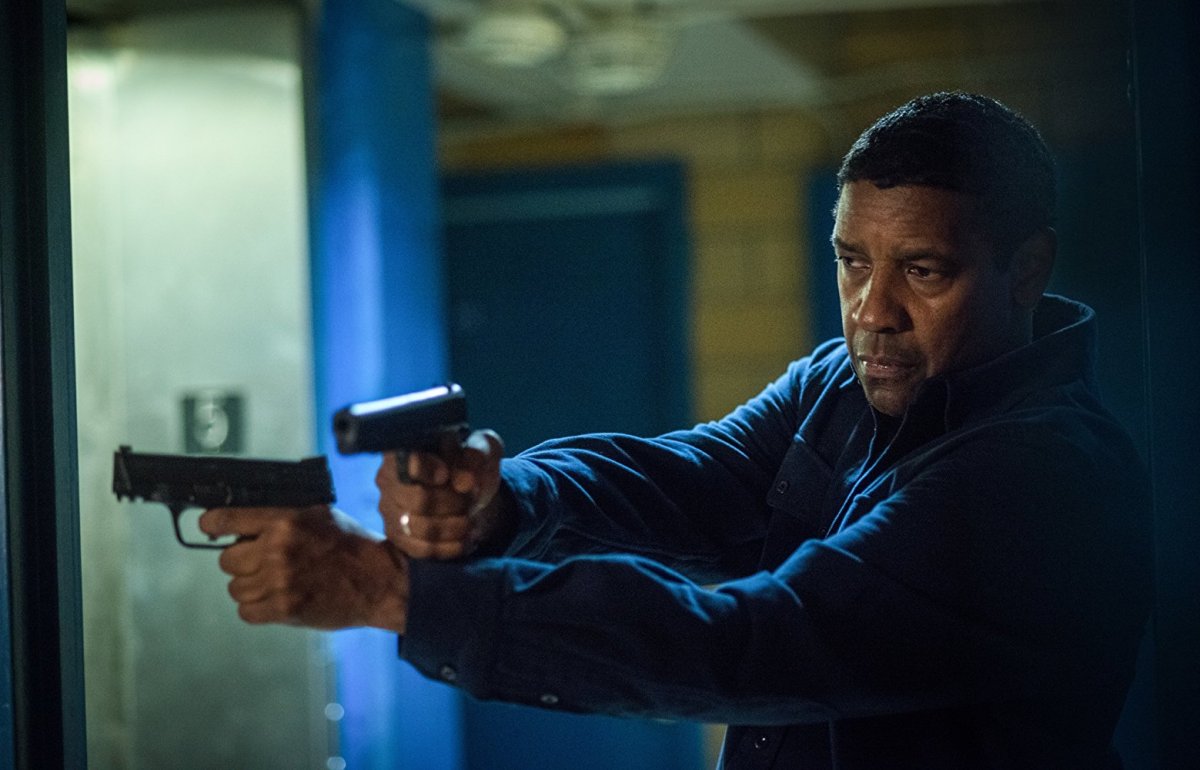With The Equalizer 2 on deck for a Friday opening, let’s praise the muscular duo of Director Antoine Fuqua and his leading man in power pop pulp, Denzel Washington. This is the pair’s fourth film together, following the surprise hit first The Equalizer (2014) adapted from the white-man-fronted vengeance-fueled TV show. They also teamed on the ensemble Western remake The Magnificent Seven (2016). And it’s been 18 years since their gritty 2001 cop drama Training Day, which pushed Washington to a Best Actor Oscar and had enough juice to get his white co-star Ethan Hawke nominated for Best Supporting Actor.
Like Martin Scorsese and Robert DeNiro (sorry Leo!), Steven Spielberg and Tom Hanks – or Mel Brooks and Gene Wilder, Fuqua and Washington have forged a strong – and profitable – partnership. It has been consistently bankable – with their first movie grossing over $100M worldwide, followed by Equalizer brushing up against $200M globally and their Western grossing $162M. Their combination of bold storytelling on the frame of familiar genres and remakes riding on Denzel’s star power has made their collaboration bankable.
The latest film takes Washington’s ex-CIA liquidator Robert McCall out of the Home Mart that he decimated in the last movie’s climax and puts him behind the wheel as a Lyft driver – with no pause for an anger management course. This time it’s personal (oh, wait, it’s always personal!). When fiends kill a former CIA colleague, McCall goes into overdrive, pledging to eliminate everyone involved.
The movie, as moth-eaten as the plot might be, is on track for a $30M opening weekend based on the popularity of the Fuqua-Washington pairing. It competes against the female-skewed jukebox musical sequel Mamma Mia! Here We Go Again. That is not only the definition of counterprogramming but presages a weekend dominated by women and people of color working in the mainstream!
It’s also a movie that reflects the self-knowledge and experience of both participants. The crime thriller sits squarely in the Fuqua sweet spot – violent, character-driven action movies that exist in a moral hot zone. And Denzel is his Charles Bronson, a man of passion and intensity obsessed with getting his target whatever the collateral damage to human life, property or conventional morality. Denzel adds a sharpness and wit that wasn’t exactly in Bronson’s acting toolbox.
Both men are conscientious professionals who set the tone for the entire production. They don’t mess around even if the world on screen is as messed up as possible. Their communication is often nonverbal, as Fuqua recently explained to Uproxx,“…there are times we’ve done a scene and I’m thinking something and he’ll already do it. Or there will be moments he’ll be doing something and I’ll bring the camera around and capture it. And he knew it, he’ll say, ‘I knew you’d want that.’ So it’s that kind of relationship.”
For Washington, who broke out in the 1980s as Dr. Steven Chandler on TV’s medical soap St. Elsewhere, his first actor-director collaboration began on the indie art circuit with his landmark Spike Lee movies. Starting with Washington’s role as the troubled jazz trumpeter Bleek Gilliam in Mo’ Better Blues (1990), followed by an Oscar nom for his title role in Malcolm X (1992), He Got Game (1998) and Inside Man (2006). According to IndieWire, it still bugs Lee that Washington didn’t win for Malcolm X – as is apparent when, in Lee’s TV remake of She’s Gotta Have It, the character Nola Darling explains Denzel’s 1993 loss to Al Pacino: “He was too black; too strong.”
Is that characterization an obstacle for Fuqua and Washington? No.
The duo have turned Darling’s lament into a battle cry: no one is too black or too strong. In fact, they refuse to see the world in black and white, letting the film’s meat and message be delivered through highly-developed characters and nonstop action. Denzel, the very definition of a leading man, is a powerful force that can not only drive a genre narrative but elevate it to a level of truth and power unequaled by lesser actors. Fuqua grasps that in Washington and delivers vehicle after vehicle that let the actor shine. He may play a hero or a villain – but he’s never a victim. Fuqua’s mantra could be: Kick ass. Take names. Cast Denzel.
This article appeared in an InsideHook newsletter. Sign up for free to get more on travel, wellness, style, drinking, and culture.

























